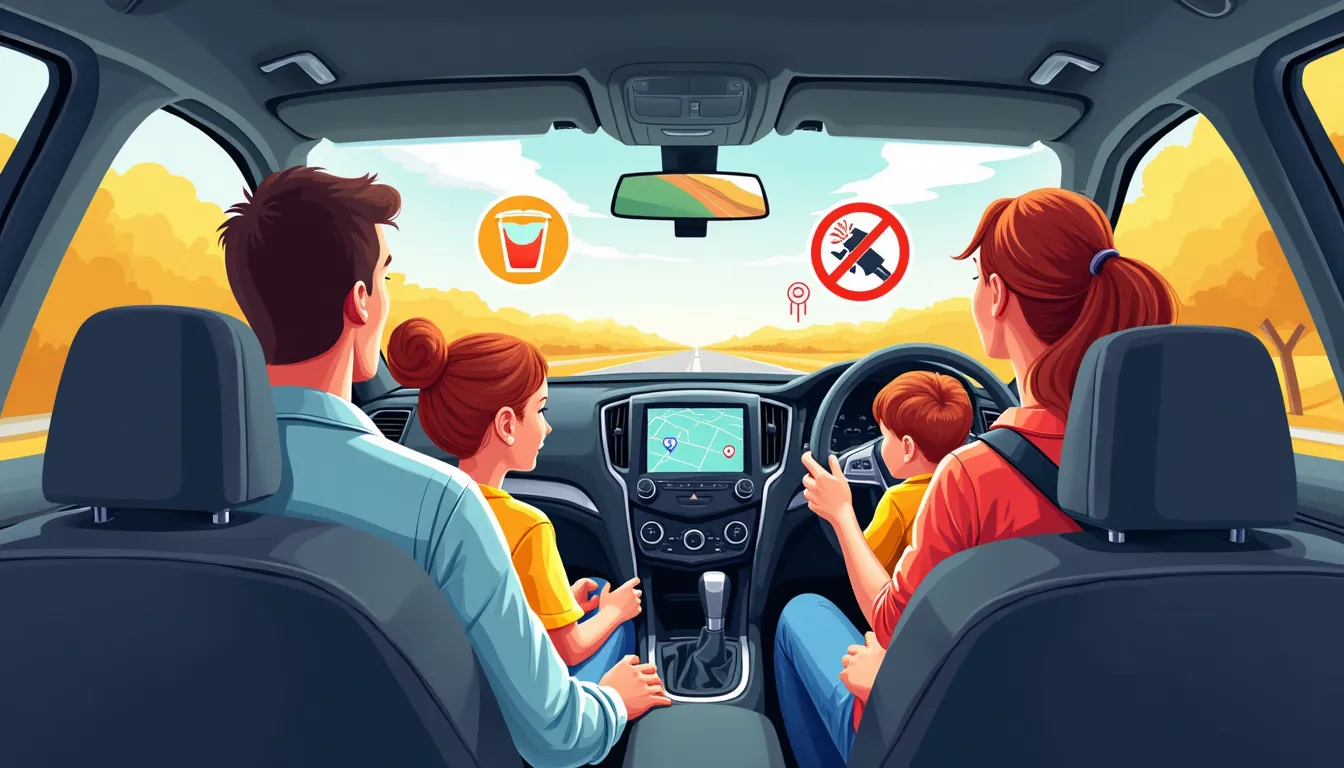Embarking on a road trip is an exciting adventure, offering the freedom to explore new places and create lasting memories. However, ensuring a smooth and enjoyable journey requires careful planning and attention to safety. In this comprehensive guide, we’ll provide you with essential road trip safety tips to help you prepare effectively, stay alert on the road, and handle any unexpected situations that might arise. From pre-trip preparation steps, such as vehicle inspections and packing essential safety items, to on-the-road best practices for driving long distances and managing emergencies, these tips are designed to keep you and your loved ones safe throughout your travels. Whether you’re a seasoned road trip enthusiast or hitting the open road for the first time, these road trip safety tips are crucial for a secure and stress-free experience.
Pre-Trip Preparation: Key Road Trip Safety Tips to Ensure a Smooth Start
Vehicle Inspection and Maintenance
Embarking on a road journey calls for meticulous preparation, starting with your vehicle’s inspection and maintenance. One of the foremost road trip safety tips is ensuring that your car is in perfect condition. A comprehensive vehicle check can prevent unexpected breakdowns and ensure a hassle-free trip.
1. Check Fluid Levels:
Ensure that essential fluids like engine oil, brake fluid, transmission fluid, and windshield washer fluid are topped up. An oil change might be necessary if you are due for one. Maintaining proper fluid levels enhances the overall performance of your vehicle.
2. Battery Health:
Examine the car battery for any signs of corrosion and clean the terminals if needed. A weak battery can spoil your travel plans, so consider having your battery tested if it’s older than three years.
3. Tire Condition:
Inspecting your tires is crucial for road trip safety. Check for adequate tread depth and wear and ensure the tires are properly inflated, including the spare tire. Misaligned or unbalanced tires can lead to accidents, so it might be beneficial to get a professional tire alignment.
4. Brake Systems:
Brakes are fundamental for a safe journey. Have your brake pads and rotors checked, and replace them if they are worn out. Functioning brakes mean greater control and stability on the road.
5. Lights and Indicators:
Ensure all lights, including headlights, brake lights, indicators, and hazard lights, are functioning correctly. Visibility is key to road safety, especially when driving at night or in adverse weather conditions.
6. Wiper Blades:
Effective windshield wipers are essential for clear visibility during rain or snow. Replace worn-out wiper blades to avoid streaking and ensure they are in good condition.
7. HVAC System:
Your heating, ventilation, and air conditioning (HVAC) system should work properly to keep you comfortable during the drive. It’s also beneficial for defogging the windows.
Essential Items to Pack for Safety
Packing for a road trip involves more than just clothes and snacks. Equipping your vehicle with essential safety items is a cardinal part of road trip safety tips, ensuring you’re prepared for any situation.
1. First-Aid Kit:
A well-stocked first-aid kit is indispensable. It should include bandages, antiseptic wipes, pain relievers, scissors, tweezers, and any prescription medications your family may need. Being prepared can make a significant difference in case of minor injuries.
2. Emergency Car Kit:
Equip your vehicle with an emergency car kit that includes jumper cables, a tire jack, lug wrench, tow rope, reflective triangles, and a multi-tool. Additionally, a flashlight with extra batteries can be a lifesaver in the dark.
3. Spare Tire:
A fully inflated spare tire and the tools to change it are essential. Familiarize yourself with how to change a tire before setting off. This knowledge can save you valuable time and prevent unnecessary stress on the road.
4. Road Flares and Reflective Vests:
These items enhance your visibility in case of a breakdown, especially at night. Road flares can signal distress and alert other drivers of your presence, reducing the risk of accidents while you address the issue.
5. Portable Phone Charger:
Ensuring your phone remains charged can be crucial in emergencies. A portable charger or a car charger will help you stay connected, find routes, and call for help if needed.
6. Water and Non-Perishable Food:
Carrying an ample supply of drinking water and non-perishable snacks like granola bars, nuts, and dried fruits is vital. These items can sustain you in case you encounter delays or are stranded for any period.
7. Blankets and Extra Clothing:
Weather conditions can be unpredictable. Keeping blankets and extra clothing, including hats and gloves, can keep you warm if you’re stuck in a cold environment or if the car heater fails.
8. Maps and Travel Guides:
While GPS technology is incredibly reliable, having physical maps and travel guides can be helpful in areas with poor cell service. They also offer a backup navigation option.
Thorough pre-trip preparation with these vehicle inspection and essential packing road trip safety tips ensures a smooth start to your journey. By taking these precautionary steps, you set a solid foundation for a safe and enjoyable road trip.
Discover more travel tips and insights on our blog.

On-the-Road Safety: How to Stay Safe and Alert During Your Road Trip
Best Practices for Driving Long Distances
Embarking on a lengthy road journey can be an exhilarating experience, but road trip safety tips are crucial to ensuring both your safety and the safety of your fellow travelers. To start with, maintaining proper alertness is vital. Ensure you get ample rest before commencing your trip. Ideally, a full seven to eight hours of sleep can significantly enhance your focus and reaction times.
While driving, take regular breaks. The rule of thumb recommended by health and safety experts is to take a 15-minute break every two hours or 100 miles. Use these breaks to stretch, walk, and perform gentle exercises to increase blood circulation, helping you stay awake and alert.
Stay hydrated, but avoid consuming excessive caffeine or sugary drinks. While these might provide a short-term energy boost, they can result in energy dips and fatigue over time. Opt for water or electrolyte-balanced drinks to maintain optimal hydration levels. Snacks such as nuts, fruits, and protein bars are advisable for sustained energy.
Adhere to speed limits and driving laws, as they are designed to ensure your safety. Speeding not only increases the risk of accidents but also reduces your reaction time. Utilize cruise control on highways where appropriate to maintain a consistent speed and reduce fatigue. However, remain attentive and be ready to disengage cruise control in traffic or adverse weather conditions.
Using a GPS or a navigation app can alleviate stress, but remember to program your route before you start driving. Keep a physical map as a backup in case of technical failures. Avoid using your phone while driving. If you need to make a call or send a text, pull over to a safe area. Using hands-free devices is an option, but limiting distractions remains paramount.
Dealing with Emergencies and Unexpected Situations
Even with meticulous planning, emergencies and unexpected situations can arise. Being prepared for these scenarios is an essential aspect of road trip safety tips. First and foremost, equip your vehicle with an emergency kit. This kit should include items such as a first aid kit, flashlight, batteries, reflective warning triangles, a multi-tool, and basic car repair tools like jumper cables and a tire inflator.
If you find yourself in an accident, ensure your immediate safety by moving to a secure location, if possible. Check for injuries and call emergency services right away. It’s also wise to have a charged phone and an external battery pack on hand to ensure you can make emergency calls. Document the scene by taking photos and exchanging information with other involved parties.
For vehicle breakdowns, staying safe while awaiting assistance is crucial. If you can, move your vehicle to the shoulder of the road or another safe area. Turn on your hazard lights to alert other drivers, and use reflective triangles or cones to make your presence more noticeable. Avoid standing too close to your vehicle or the roadway; retreat to a safe distance whenever feasible.
Inclement weather poses another challenge. Be prepared for varying weather conditions by checking forecasts regularly. In case of rain, ensure your windshield wipers are functional, and reduce your speed to prevent hydroplaning. For snowy or icy conditions, having snow chains and an ice scraper can be invaluable. Increased stopping distances are necessary on slippery surfaces, so apply brakes gently and well in advance of stopping points.
Lastly, be alert to any signs of driver fatigue. Symptoms like frequent yawning, slow reaction times, and drifting between lanes indicate that it’s time to rest. If you experience any of these, find a safe place to stop and take a nap. Staying over at a rest area or a motel for the night is always a safer option than pushing through extreme tiredness.
By following these road trip safety tips, you can vastly improve your chances of a safe and enjoyable journey. Proactive preparation and vigilance on the road help mitigate risks and ensure you create positive, lasting memories from your adventure.
A successful and enjoyable road trip hinges on meticulous preparation and a commitment to safety throughout the journey. By conducting a thorough vehicle inspection and prioritizing maintenance before embarking on your trip, you ensure that your car runs smoothly and efficiently. Packing essential safety items, such as a first-aid kit, emergency tools, and necessary supplies, further prepares you for any unforeseen circumstances that may arise.
Once on the road, adhering to best practices for driving long distances is paramount. Staying alert, taking regular breaks, and sharing the driving responsibilities can significantly reduce the risk of accidents caused by fatigue. Equipping yourself with knowledge on how to deal with emergencies, from minor mechanical issues to major unexpected situations, empowers you to handle any challenge with confidence.
Incorporating these road trip safety tips not only protects you and your passengers but also enhances the overall travel experience. Safe and mindful driving ensures that your journey is filled with memorable adventures rather than avoidable setbacks. So, as you plan your next road trip, remember that the key to a smooth and enjoyable adventure lies in preparation, vigilance, and a steadfast dedication to safety.







